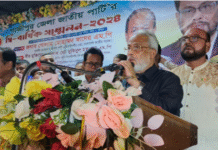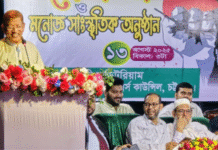
Highlights:
- BNP, BLDP, NDM have differing opinions on prime minister’s tenure
- BNP seeks time to announce its decision on PM’s term
- Jamaat for 10-year lifetime cap for anyone serving as PM
- BNP wants to revert to pre-15th amendment state principles
- Leftist parties remain firm on fundamental principles of 1972 Constitution
- NCP opposed to “Mujibist principles of 1972”
Political parties participating in the National Consensus Commission session have voiced significant dissatisfaction regarding the discussion process, agenda setting, and overall progress.
The fifth day of the second phase of the dialogue, held yesterday morning at the Foreign Service Academy in Dhaka, was marked by sharp disagreements over the prime minister’s term limit and the fundamental principles of the Constitution.
The session focused on the prime minister’s term and the fundamental principles of the Constitution, but due to time constraints, the important issue of parliamentary constituency boundary determination was left undiscussed.
Contention over PM’s term
A key point of disagreement emerged during talks on the PM’s term. An initial proposal to limit the PM to two terms (10 years total) initially received consensus from all parties, but later, three parties voiced opposition.
Salauddin Ahmed, standing committee member of the BNP, stressed the need for internal party discussions on the matter, linking it to the National Constitutional Council (NCC) and the upper house.
“You’ve mentioned that it would be better if the term is set on a yearly basis, as setting it by term or number could lead to confusion. But in order to specify how many years it should be, we must first discuss it in relation to the NCC and the upper house,” he told the commission.
Syed Abdullah Mohammad Taher, nayeb-e-ameer of Jamaat-e-Islami, said, “A PM should not be allowed to stay in power for more than 10 years in their lifetime.”
He acknowledged the BNP’s request for more time and reiterated Jamaat’s goals of ensuring governmental stability and preventing concentration of power.
Tasnim Jara of the NCP proposed a two-term limit and expressed no objection if it was set as 10 years total.
Zonayed Saki, chief coordinator of Ganosamhati Andolon, elaborated on the complication arising from the terms “term” and “number of times” in relation to the PM’s tenure. He clarified that most parties ultimately agreed on a maximum of 10 years in a lifetime, with three parties opposing this proposal.
Ali Riaz, vice president of the Consensus Commission, said the BNP, Bangladesh Liberal Democratic Party, and Nationalist Democratic Movement hold differing opinions but confirmed “significant progress toward a common position regarding the PM’s term,” expressing hope for consensus in the next meeting.
Debate on fundamental principles
On the fundamental principles of state governance, Salauddin stressed the BNP’s desire to revert to the pre-Fifteenth Amendment state, including the inclusion of ‘Bismillahir Rahmanir Rahim’ and faith in Allah, while rejecting the Fifteenth Amendment.
He said, “If we receive the mandate, we will include equality, human dignity and justice, and democracy.”
Jamaat’s Taher confirmed agreement on equality, human dignity, and justice, but noted opposition from left-leaning parties to the return to the pre-Fifteenth Amendment state.
Ruhin Hossain Prince, general secretary of the Communist Party of Bangladesh, said leftist parties’ unwavering stance on the “principles of 1972,” calling them foundational and opposing any exclusion.
He declared, “There is no scope to exclude any of them,” and said consensus cannot be reached by altering these core principles.
Zonayed Saki echoed the importance of retaining Bangladesh’s founding principles while allowing additions.
However, Javed Raseen, joint convenor of NCP, highlighted their opposition to the “Mujibist principles of 1972” regarding the fundamental principles of the state, indicating openness to alternative proposals that exclude those principles.
Frustration over lack of concrete conclusions
Hamidur Rahman Azad, assistant secretary general of Jamaat-e-Islami, said, “Many good discussions are taking place, but there’s no conclusion. We move one step forward and three steps back.”
He urged for a “proper process” with a “specific agenda” to achieve “concrete conclusions” within a defined timeline, highlighting public expectations and state expenditures.
Nurul Haque Nur, president of Gono Odhikar Parishad, expressed concern over rigid positions, warning, “If this continues, there will never be 100% consensus – not even until the end of time. A standard or threshold for consensus must be defined here.”
Ali Riaz announced that a written proposal on the fundamental principles will be prepared based on yesterday’s discussions and party sentiments. Meetings have been postponed for two days to facilitate internal party discussions.









